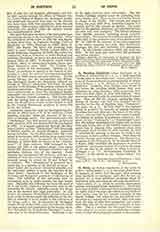

In Partibus Infidelium (often shortened to in partibus or abbreviated as i. p. i.), a term meaning in the lands of the unbelievers”, words added to the name of the see conferred on non-residential or titular Latin bishops, e.g. N., Bishop of Tyre in partibus infidelium. Formerly, when bishops were forced to flee before the invading infidel hordes, they were welcomed by other Churches, while preserving their titles and their rights to their own dioceses. They were even entrusted with the administration of vacant sees. Thus we find St. Gregory appointing John, Bishop of Alessio, who had been expelled by his enemies, to the See of Squillace (cap. “Pastoralis”, xlii, caus. vii, q. 1). In later days it was deemed fitting to preserve the memory of ancient Christian Churches that had fallen into the hands of the unbelievers; this was done by giving their names to auxiliary bishops or bishops in missionary countries. Fagnani (in cap. “Episcopalia”, i, “De privilegiis”) says that the regular appointment of titular bishops dates back only to the time of the Twelfth Lateran Council under Leo X (Session IX); cardinals alone were authorized to ask for them for their dioceses. St. Pius V extended the privilege to the sees in which it was customary to have auxiliary bishops. Since then the practice became more widespread. The Sacred Congregation of the Propaganda, by its circular letter of March 3, 1882, abolished the expression in partibus infidelium; the present custom is to join to the name of the see that of the district to which it formerly belonged, e.g. “N., Archiepiscopus Corinthius in Achaia“, or else merely to say “titular bishop” (see Bishop).
A. BOUDINHON

